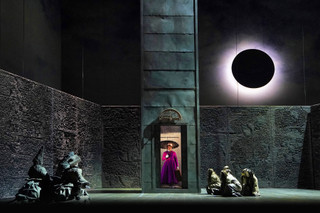|
Back
Sisyphean Ruhl? Los Angeles
Dorothy Chandler Pavilion
02/01/2020 - & February 8, 14, 16, 20, 23, 2020
Matthew Aucoin: Eurydice (World Premiere)
Danielle de Niese (Eurydice), Joshua Hopkins (Orpheus), Rod Gilfrey (father), John Holiday (Orpheus’s double), Barry Banks (Hades), Stacey Tappan (little stone), Raehann Bryce-Davis (big stone), Kevin Ray (loud stone)
Los Angeles Opera Chorus , Grant Gershon (chorus master), Roberto Cani (concertmaster), Los Angeles Opera Orchestra, Matthew Aucoin (conductor)
Sarah Ruhl (librettist), Mary Zimmerman (stage director), Daniel Ostling (set designer), Ana Kuzmanic (costume designer), T.J. Gerckens (lighting designer), Denis Jones (choreographer)

D. de Niese (© Cory Weaver)
Determined to become a poet, Sarah Ruhl had a transformation after being encouraged by her mentor, Paula Vogel, to become a playwright. Integration of poetry and play writing began during her education at Brown University. This set a foundation upon which she expanded words into works of powerful perspectives. She is quoted as saying, “...of all my plays, Eurydice is the closest to poetry, where I started.” Loosely plucked from Ovid’s Metamorphoses [Book X], Orpheus and Eurydice is the mythological tale of the doomed couple, dealing with love, inevitable death and, ultimately, loss. The storyline was significant since she lost her father to cancer at age 20, so digesting Ovid’s œuvre became a coping mechanism with the two issues merging in “binary reciprocity”. This action took a step forward when the soft-spoken, self-assured, playwright permitted herself to ‘go public’ with her story after meeting wunderkind Matthew Aucoin whose additional sensibilities gave Eurydice more gravity.
Sarah Ruhl wanted the age-old myth to be told from Eurydice’s point-of-view. As such, the bookish Eurydice slips not once, but twice into the Underworld and into a den of hopelessness. Danielle de Niese’s spiky (and occasionally cracked) notes turn towards mildly Zemlinsky-esque detail. Joshua Hopkins’ immature Orpheus pierces with confident brashness, alive and freshly flushed though the character is panned by John Holiday as a vitalized ‘shadow’ to epitomize “The Spirit of Music”: the set-up begins to establish a competitive clause within the opera [more on that later.]
The most stable and guiding force is directed towards Rod Gilfrey. Though somewhat over masked by Maestro Aucoin’s volume, Gilfrey’s paternal passages are sage, firm and loving. When father and daughter are re-united, their duet embodies an almost Verdian connection, not unlike that of an abstract Simon Boccanegra moment. Imposing and inexhaustible hurdles must be overcome to subdue The River of Forgetfulness. Exercising the droplets from one of Hades’s symbolic aqueous sources, this is the agent that turns on the power of forgetfulness and oblivion. The occurrence and outcomes are devastating…the final section finds a Romeo and Juliet moment coming to life. Though Eurydice doesn’t resonate demonstrable pathos, this passage is particularly penetrating.
Under the direction of Mary Zimmerman, the opera has pulse and capriciousness. One of the captivating forces that helps energize the production is Dan Ostling’s scenic vistas. There’s tremendous texture with nuanced shadings…it’s like spinning through a ‘lazy Susan’, stopping to experience a wide variety of visual morsels. Even smacks of bloody reds bleed upon the wall…the palette’s gamut is fully unleashed. If it weren’t for T.J. Gerckens’ lighting lens, Eurydice’s hefty bumps wouldn’t exist. Resting upon a congealed mattress of John Adams and Philip Glass, Matthew Aucoin twists the score in split-seconds: sublime, mischievous, nerve-wracking, tempestuous and appalling.
Ana Kuzmanic raises the level of richness through suffusions of color and patterns that travel all over the map. Encased in tones of gris marble-esque folds, Stacey Tappan, Raehann Bryce-Davis and Kevin Ray give comedic breaths as they whimsically dash about like Kafka-esque bureaucrats, though they don’t have anything meaningful to say most of the time. At times, M. Aucoin’s writing gets so tense, it’s like a rubber band being over-torqued, only to be snapped back by this Greek Chorus gallery.
Hell has its own moments of pseudo-lightness with Hades mutating throughout, first appearing under the guise of “An Interesting Man.” Sarah Ruhl’s degreed zaniness comes to us through Barry Banks’ off-kilter king, splayed out in chartreuse-plaid with a cockiness that leans into a Boito/Gounod Mephistofeles construct: M. Banks teeters on shavings of grotesqueness and a plane of waggishness. Cleverly, M. Aucoin appointed an extremely high and affected tenor voice, adding an oxymoronic façade.
Maybe the attraction of Orpheus towards his own music is in competition with that of the love for Eurydice. Is he more ardently in love with music? At that fateful moment when Orpheus turns back to glance at Eurydice, he asks, “Do you [still] love me?” The response concludes with, “I think so.” Might that be why de Niese finally concedes to lay to rest with her father?
As a retinue of Cerberus-derived henchman and the stone trio parade around the collapsed string house constructed by Eurydice's father, Sisyphus laboriously walks across the stage, rolling a gargantuan rock. Perhaps the key to this entire production turns to this rôle of this Ephyran king and his arduous task of moving a boulder uphill to no avail. Metaphorically, Orpheus and Eurydice manage to re-group and re-engage, but attempts are futile. Four times The River of Forgetfulness seizes its droplets upon the heads of three people...maybe that’s why this story continues to try and absolve itself, but to no avail. Maybe loss and grief will never be fully understood...it never goes away. Sarah Ruhl manages to get this point across with amazing articulation.
Christie Grimstad
|